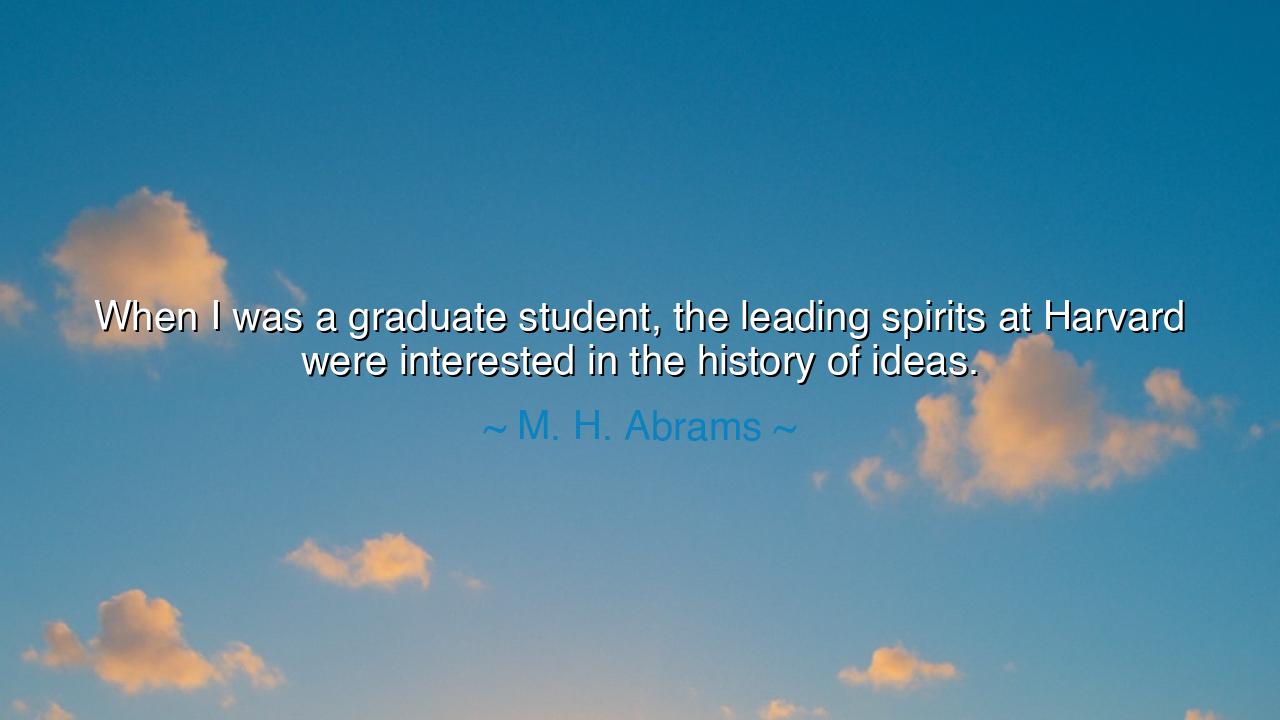
When I was a graduate student, the leading spirits at Harvard
When I was a graduate student, the leading spirits at Harvard were interested in the history of ideas.






The words of M. H. Abrams — “When I was a graduate student, the leading spirits at Harvard were interested in the history of ideas.” — sound like a quiet recollection, yet within them breathes a timeless reflection on the evolution of thought itself. Beneath their modest phrasing lies a revelation about what it means to study, to seek, and to belong to the eternal lineage of those who ask not merely what is true, but how truth came to be known. Abrams, one of the great literary scholars of the twentieth century, speaks here as a witness to an age when learning was not yet fragmented by narrow specialization, but guided by a noble curiosity — a reverence for the history of ideas, the grand river of human understanding that flows through time.
When Meyer Howard Abrams studied at Harvard in the early years of the twentieth century, he entered a world charged with the vitality of intellectual discovery. The university’s “leading spirits” — those scholars whose influence shaped generations — did not view knowledge as a set of isolated facts, but as a living organism, growing and transforming through the ages. They were not content to analyze words without understanding the ideas that gave them birth. To study the history of ideas was to trace the heartbeat of civilization itself — to follow how faith, art, science, and philosophy intertwined to form the consciousness of humanity. It was a time when learning still sought unity, when scholars stood like architects upon the foundations of the past, building bridges between reason and imagination, tradition and change.
Abrams himself would become one of the most luminous inheritors of this tradition. His later works, such as The Mirror and the Lamp, did not simply interpret literature — they illuminated the evolution of human thought through the ages. He saw poetry not as mere ornament, but as a vessel of philosophy and emotion, a mirror reflecting the mind of man and a lamp revealing the inner fire of creativity. His Harvard years, shaped by teachers who cherished the genealogy of thought, forged in him a vision of scholarship that was both historical and human — a vision that saw knowledge not as a possession, but as a dialogue across centuries.
The ancients would have recognized this approach as the truest form of wisdom. In the Academy of Plato, students were taught that philosophy began in wonder — that every idea is born from the echo of an earlier question. The philosopher, like the historian, must walk backward as well as forward, understanding that all things new are built upon the foundations of what came before. To study the history of ideas is therefore to honor the continuity of the human spirit — to see thought as a chain, unbroken though ever changing, linking the mind of Socrates to that of Newton, of Newton to Einstein, of Wordsworth to Abrams himself.
There is a deep humility in this recognition. Abrams’ tone — reflective, reverent — reminds us that every generation stands on the shoulders of those before it. The “leading spirits” of Harvard were not inventors of knowledge, but custodians of an inheritance. They believed that understanding the lineage of thought gave meaning to discovery, just as a tree draws life from its unseen roots. In a world increasingly obsessed with novelty, their devotion to the past was an act of defiance — a declaration that the future can only be understood through the wisdom of history.
Consider the life of Isaac Newton, who once wrote, “If I have seen further, it is by standing on the shoulders of giants.” Newton’s words echo precisely the spirit Abrams describes — the recognition that the progress of knowledge is cumulative, that each thinker is both heir and benefactor in the grand inheritance of the mind. The same truth guided M. H. Abrams, who understood that the study of literature, like the study of science, is a dialogue between ages — a conversation in which the dead speak still, and the living must learn to listen.
So let this be the teaching to those who seek wisdom: cherish the history of ideas, for it is the history of ourselves. Do not rush to discover what is new before you have understood what has been. Read not only the latest voice, but the oldest whisper. To study history is to awaken gratitude; to trace the lineage of thought is to know that you, too, are part of something vast and sacred — the ever-unfolding story of the human mind.
For in the end, M. H. Abrams’ reflection is more than nostalgia — it is a summons. It calls us back to the deeper purpose of learning: to see knowledge as communion, to see scholarship as continuity. The “leading spirits” he remembers are gone, yet their light endures wherever men and women seek to understand not only what we think, but why we think as we do. The study of the history of ideas is the study of our shared soul — the record of humanity’s striving toward truth. And so, as the ancients would say, honor the past, for it is the seed of your own becoming; and let your own thought be worthy to take its place among the great and everlasting conversation of the ages.






AAdministratorAdministrator
Welcome, honored guests. Please leave a comment, we will respond soon